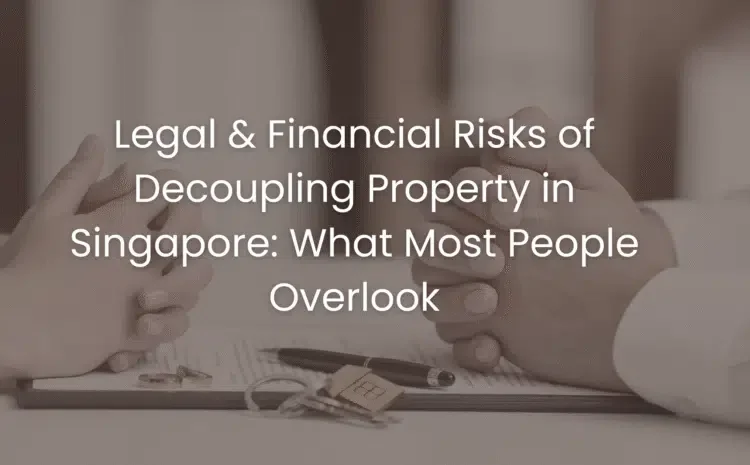Legal & Financial Risks of Decoupling Property in Singapore: What Most People Overlook
While decoupling property in Singapore is a popular strategy to avoid Additional Buyer’s Stamp Duty (ABSD), many homeowners jump into it without understanding the legal and financial risks involved. Yes, the potential tax savings are real—but the costs, complications, and consequences can be significant if you don’t plan it right.
In this article, we break down the most common risks and overlooked pitfalls of decoupling, so you can make a truly informed decision—not just one that looks good on paper.
Hidden Costs of Decoupling Property
While ABSD savings can look attractive, decoupling is not a zero-cost strategy. Here are costs many homeowners don’t anticipate:
1. Buyer’s Stamp Duty (BSD)
Even though you’re transferring ownership to your spouse or co-owner, the transaction is still treated as a property sale. The buyer must pay Buyer’s Stamp Duty based on the market value of the share transferred.
For example: If the half-share is valued at $1 million, BSD can amount to $24,600 or more.
2. Legal Fees & Valuation Costs
You’ll need a property lawyer to:
Draft the Sale & Purchase Agreement
Handle CPF Board submissions
Lodge documents with the Singapore Land Authority (SLA) and IRAS
This process falls under our Property & Finance Law services and typically includes conveyancing, CPF coordination, and stamp duty filings.
3. CPF Refunds and Accrued Interest
The selling party must refund all CPF funds used for the property, plus accrued interest (currently 2.5% annually, compounded).
If you decouple by gift, not sale, both parties may be required to refund their CPF in full, which can be financially overwhelming.
Learn more in our guide: CPF Refund After Decoupling
Mortgage Risks You Might Not See Coming
4. Full Loan Repayment May Be Required
If you’re decoupling via gift, banks usually require the entire mortgage to be redeemed before the transfer. This means:
You’ll need to pay off the loan in full
The remaining owner must qualify for a new loan on their ow
This becomes a huge problem if the sole owner doesn’t meet income or Total Debt Servicing Ratio (TDSR) requirements.
5. Rejection of Loan Refinance
Even in an S&P transaction, the sole buyer must refinance the loan. If banks reject the loan or offer poor terms, the deal could fall apart or result in higher monthly repayments.
Before decoupling, it’s wise to get a mortgage assessment and legal review with our team.
Legal & Estate Planning Complications
6. Inheritance and Ownership Issues
After decoupling, the property becomes fully owned by one party. If something happens to the sole owner, the share of the property:
May not automatically go to the spouse or children
Could be frozen under the Intestate Succession Act if no Will exists
If you’re planning to decouple, it’s essential to update your Lasting Power of Attorney (LPA) and ensure Letters of Administration won’t be necessary in the future.
7. IRAS May Question “Artificial Arrangements”
If the transfer is done at below-market value or appears to be a sham, IRAS may investigate for tax avoidance. You could face:
Penalties
Additional tax assessments
Transaction rejection
When You Should Not Decouple
Despite the ABSD savings, decoupling may not be the best option if:
You’re unable to qualify for refinancing as a sole owner
You have tight cash flow and can’t handle CPF refunds or stamp duties
You don’t have an updated estate plan
The future plan includes selling the property soon (making decoupling redundant)
In such cases, a better solution may be joint investment planning, Wills, or holding property under a trust.
How YY Lee & Associates LLC Helps You Avoid These Risks
Decoupling is not a one-size-fits-all move. Our team provides:
Full legal review of your decoupling strategy
CPF refund calculations and compliance
S&P vs. Gift structuring advice (Read our full comparison article)
Mortgage and ownership impact review
Post-transfer estate planning updates (Wills & Probate, LPA, and more)
Visit our About Me page to meet our property and family law specialists.
Plan With Confidence—Avoid Costly Mistakes
Don’t let ABSD savings blindside you to legal risks. Speak with a lawyer who understands both real estate law and estate planning to future-proof your move.
Call or WhatsApp us at +65 8780 2499
Message us on Instagram:@yylee_familylaw
Frequently Asked Questions
-
The risks include CPF refund obligations, stamp duties, full loan repayment, estate issues, and IRAS audits if the transaction is not structured properly.
-
Yes, if the sole buyer can’t secure financing, the deal may collapse—leading to delays, penalties, or forced sale.
-
Yes, especially if you’re no longer a co-owner. A Will ensures your property is passed on according to your wishes after a change in ownership.

